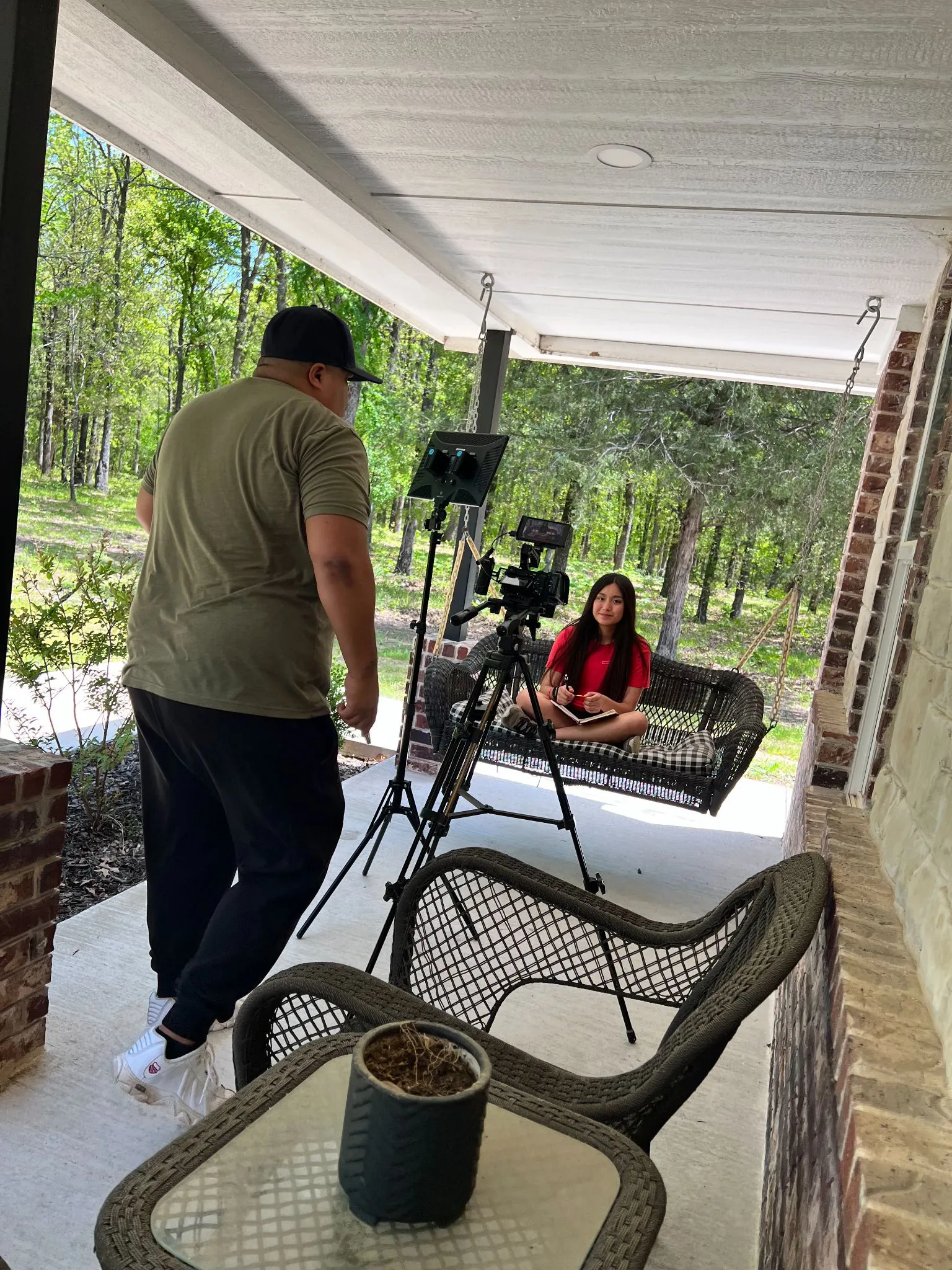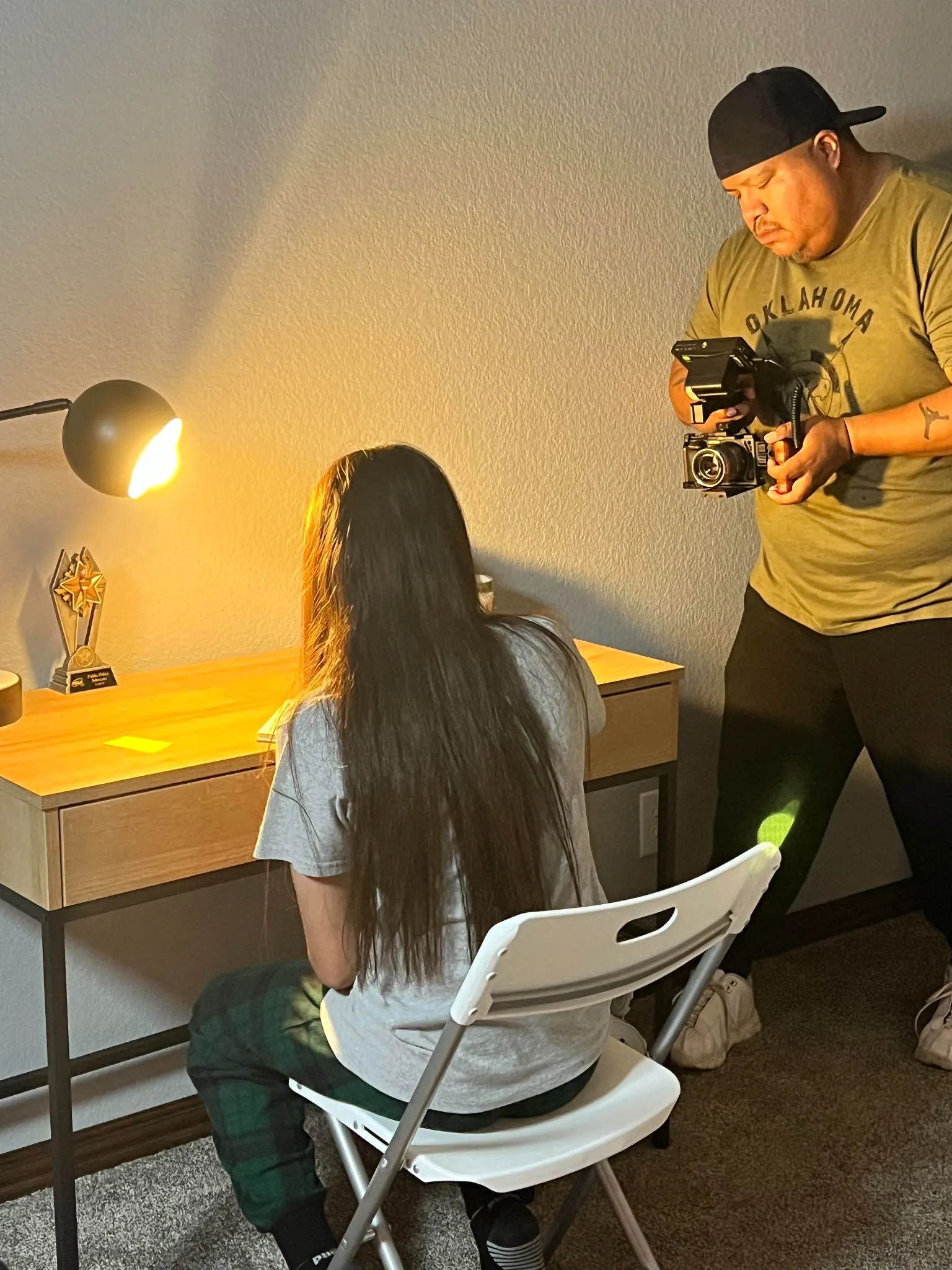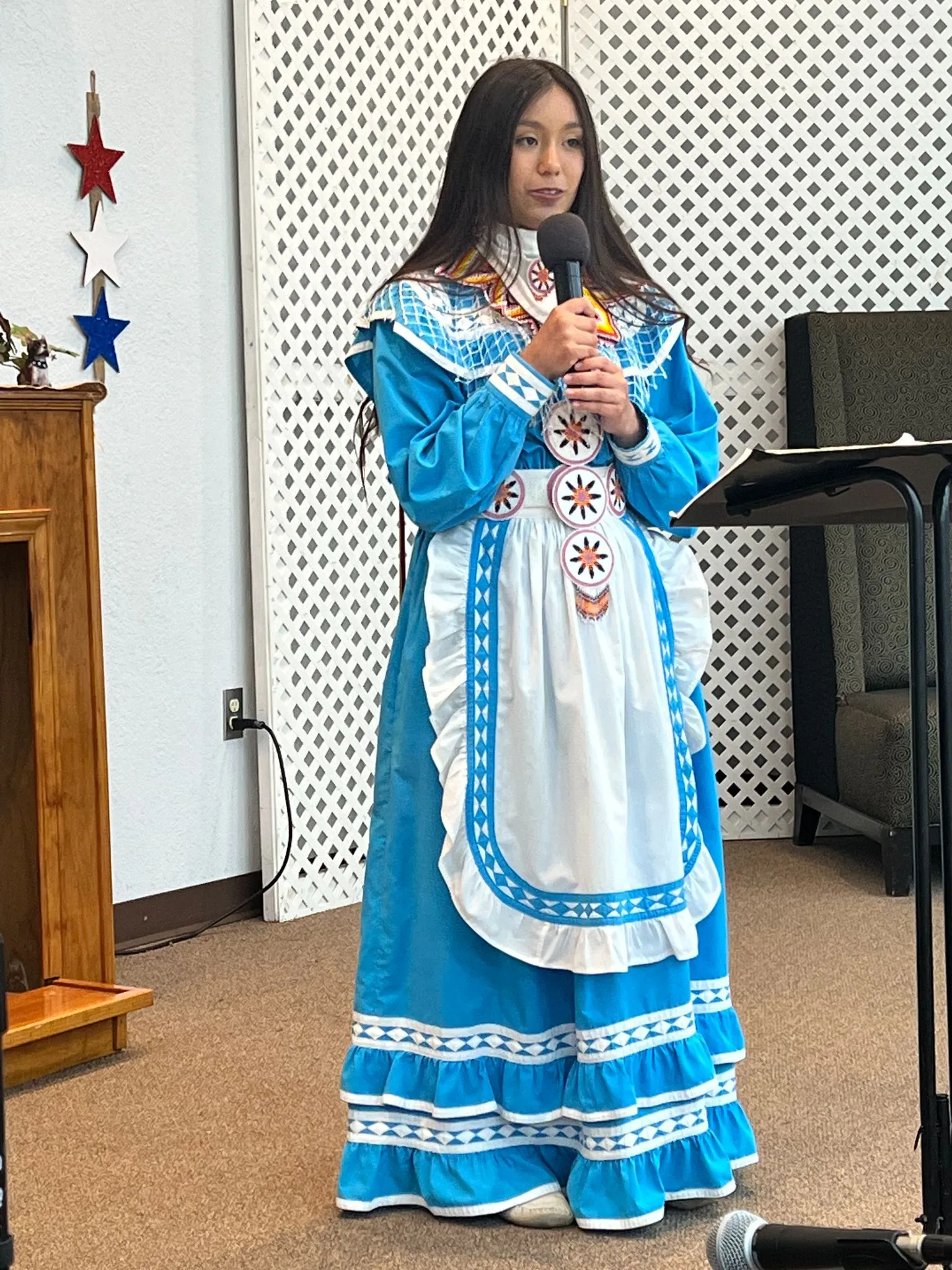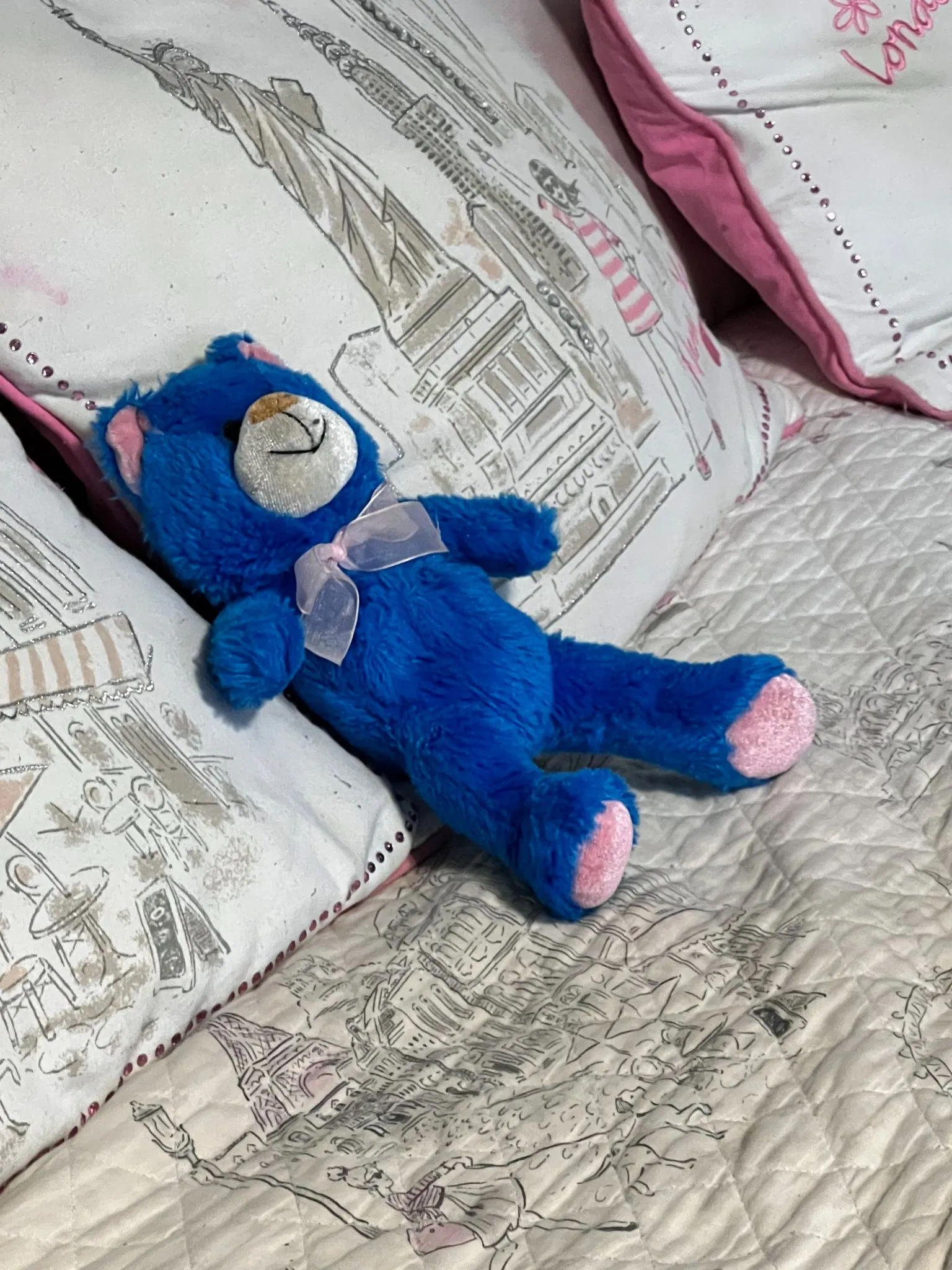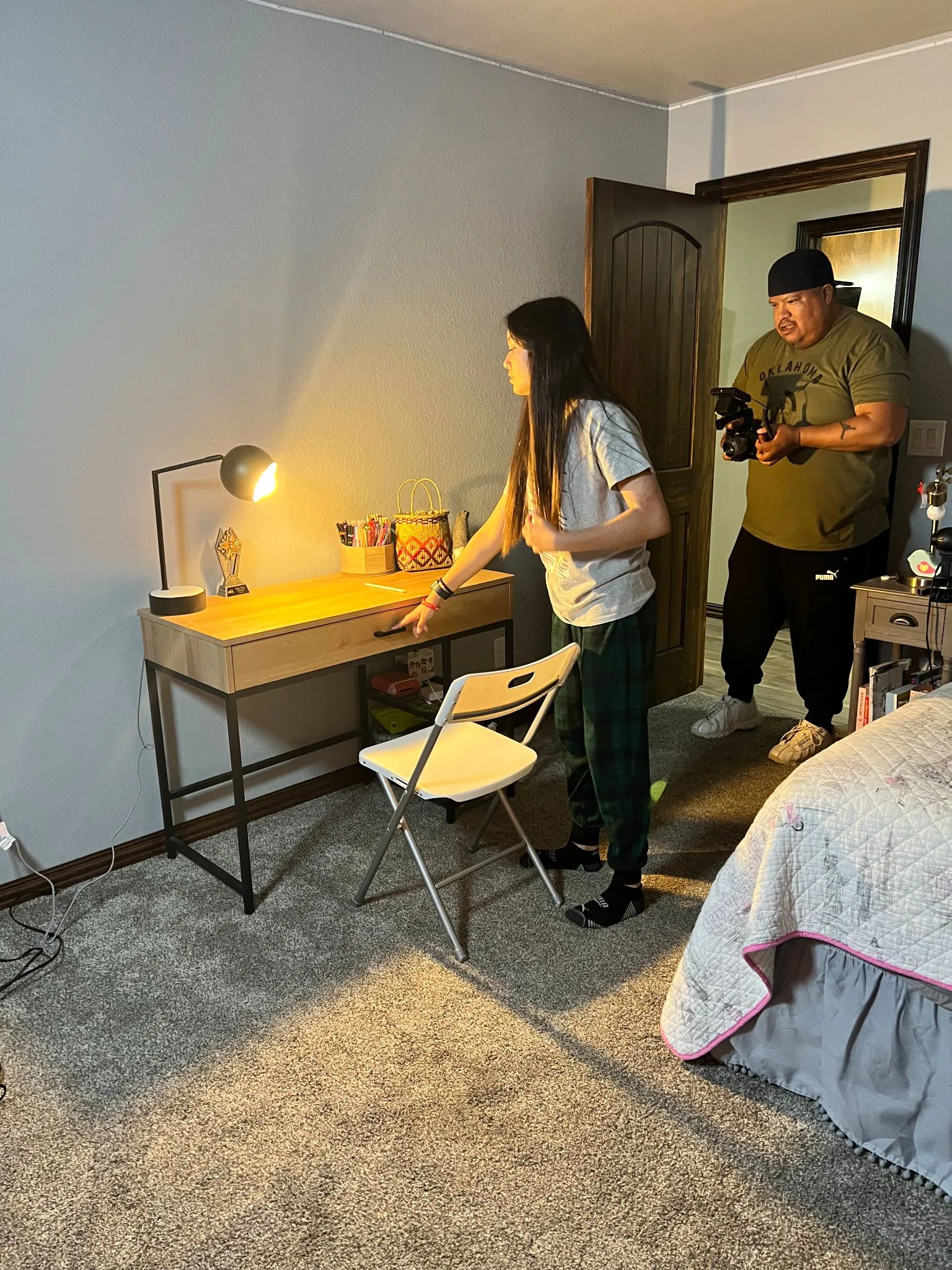🏘️ This resource is specifically designed for native communities.
💲 This resource has a fee to access.
Little Brown Eyed Girl with the Long Brown Hair: Adelyn's Story
Adelyn Brown, citizen of the Choctaw Nation of Oklahoma with lived experience shares her own story of being removed from her mother’s home by child welfare and placement into the foster care system. The video begins with Adelyn writing her story and narrating her thoughts through an emotional journey of separation and loss. Her story emphasizes the importance of the Indian Child Welfare Act in keeping children and youth connected to their tribe of origin and their culture. 🏘️
If you prefer to quick review one resource or part of the course, you can click on the buttons below.
Course Resources
These pictures show Mark Williams working with Adelyn and the teddy bear that the youth shelter gave her the night she was removed.
The Spirit of ICWA
This course shares the history, key aspects, and the spirit of the Indian Child Welfare Act. It takes about 75 minutes to complete the whole course. You must access the whole course to gain a certificate of completion. It does not have to be completed in one sitting, you can log in with your Google account to save your progress and return to it via the same link. 🏘️
If you prefer to quick review one aspect of ICWA, you can click on the buttons below or use the Guidelines for Implementing the Indian Child Welfare Act.
Promoting Healing and Resiliency for Indigenous Families
To better understand how the impact of separation and loss have changed family roles and begin to reconcile Indigenous teachings and practices to heal for future generations. Participants will be provided information and tools to begin healing through Indigenous ways of knowing and healing practices. Caregivers, from an Indigenous perspective, are the “matriarch of the family” and become the advocate and can contribute to healing families. 🏘️
Trauma, Healing and Reconciliation in Indian Child Welfare
Sandy shares her personal story through removal, trauma, and healing. The information includes implications of the trauma histories of Indigenous people to encourage caregivers and practitioners to recognize and support healing from the intergenerational trauma impact on individual, families, communities, and Tribal Nations. This session was originally presented at the Southern Plains Child Protection Team Conference in September 2023. 🏘️
If you prefer to quick review one resource or part of the course, you can click on the buttons below.
Course Resources
History of Native Americans and Montana's Reservations
This video is designed to bring awareness and trauma informed understanding to staff who work with Native American youth in Montana. It provides a high level overview of the experiences of Native American’s experience in Montana to help improve the services provided to Native American families and children. It will cover the following topics:
-
Section 1: History of American Indian Tribes
-
Section 2: Why Reservations Were Created
-
Section 3: Life in Boarding Schools
-
Section 4: Era of Change
-
Section 5: Montana Reservations
Partner Training Modules
PARTNER HIGHLIGHT
Basic Child Welfare Training Certificate | The Bureau of Indian Affairs is currently offering the following free training opportunities, along with the option to earn a Basic Child Welfare Training Certificate. These web-based eLearning courses expand on the tele-coaching topics and are available 24/7, for drop-in learning for all child protection staff. Courses cover:
-
Trauma and ACEs (3 hrs)
-
Trauma-Informed Child Development (3 hrs)
-
Self-Care and Secondary Trauma (3 hrs)
-
Documentation in Child Protection (3 hrs)
-
Working with the Court to Protect Children (3 hrs)
-
Assessment and Differential Response (3 hrs)
-
Ethics in Child Protection (2 hrs)
Recorded tele-coaching sessions have also been recorded and are available on this site. 🏘️
ADDITONAL TRAINING MODULES
An Introduction to the Prevention Core Competencies for Prevention Professionals | This course covers the foundations of substance use prevention science for early and mid-career prevention professionals. By taking this course, you’ll be able to expand your knowledge and skills in the field of prevention and ultimately enhance your ability to make a positive impact in your community.
Connecting the Dots | Different types of violence are connected and often share the same root causes. This training explores how different types of violence can take place in the same house, in the same neighborhood, at the same time, or at different stages of life. By the end of the training, you will understand the overlapping causes of different types of violence and what can protect against violence.
Engaging With Children Who Have Been Sexually Abused in the AN/AI Population | This webinar is an overview of facts and statistics regarding children/youth who may have experienced sexual abuse. Strengthening their natural resiliency to help the child/youth move from victimization to survivor with a focus on Alaska Native/American Indian children/youth population. 🏘️
Historical Trauma, Generational Trauma and Personal Trauma – Healing Outside of Time | This webinar will share about the multiple layers of trauma many survivors experience, which can include sexual assault, domestic violence, homelessness, historical trauma, substance use, and more. 🏘️
ICWA Training Course | Increase the depth of your understanding of the Indian Child Welfare Act of 1978. Take NICWA’s online ICWA training course at your own pace. The provisions of ICWA are explained in non-legal language and presented in the order in which a child welfare worker might encounter them in an ICWA case. 🏘️💲
Implementing a Family-Centered Approach (Companion Modules) Series | NCSACW prepared this three-part series on implementing a family-centered approach to help communities move toward family-centered care.
Introduction to Working with Substance Abusing Families | The majority of Native families that encounter the child welfare system are dealing with substance abuse. In this nine-module interactive online course designed for practitioners working in the field of Indian child welfare, Tribal and First Nations child welfare workers can learn a culturally based and trauma-informed approach to helping families restore safe parenting capacity as part of substance abuse recovery. Participants will learn about the basics of addiction and recovery in the context of child welfare, identification of alcohol and drug use, the roles of the child welfare worker when working with substance-abusing families, and the importance of, and strategies for, mobilizing treatment and systems collaboration for successful outcomes. 🏘️💲
Plan of Safe Care Expert Video Series | The National Center on Substance Abuse and Child Welfare (NCSACW), with support from the Vermont Oxford Network (VON) developed a four-part series on implementing Plans of Safe Care and Family Care Plans that promote safety and well-being for pregnant people, infants, and their families affected by prenatal substance exposure.
Protecting Victim Service Providers Against Workplace Violence | Planning for victims’ and survivors’ freedom from violence is a critical component of victim services. Advocates’ safety is also a vital part of overall safety planning. Yet advocate safety can be a complex matter. Training, research, and evaluation often focus solely on the safety of victims and survivors we are privileged to serve. Without addressing advocate safety, are we missing the true impact of striving to build a deeper and more comprehensively resilient perspective of safety for all involved in the victim assistance reality. Simple steps will be shared that Victim Service Providers can use in our everyday lives. 🏘️
We All Have a Role In Preventing ACEs | ACEs affect children and families in all communities. ACEs come in many forms and can have long-term impacts on health and well-being into adulthood. This accredited, online training can help you understand, recognize, and prevent them from occurring in the first place.
Working with Family Strengths and Resilience | This e-learning acknowledges family strengths and resilience while discussing how families are impacted by poverty, disparity, and trauma. 🏘️
The Power of Storytelling | Through the art and tradition of storytelling, Christina Love will recall harmful events as a child and adult. She will also tell stories of what services, practices, and words empowered healing and hope. 🏘️
Tribal Family Wellness Plan Learning Modules | The Quality Improvement Center for Collaborative Community Court Team’s Tribal Family Wellness Plan Learning Modules prepared in collaboration with the Tribal Law and Policy Institute (TLPI), are designed to guide tribally driven collaboratives seeking to reduce the impact of substance abuse on pregnant and parenting families, improve systems and services to reduce prenatal substance exposure, prevent the separation of families, and support infant and family wellness. 🏘️
Youth Mental Health First Aid for Tribal Communities and Indigenous Peoples | This training module is designed for clinicians, mentors, and leaders to recognize and respond to suicidal ideation in native youth. 🏘️

